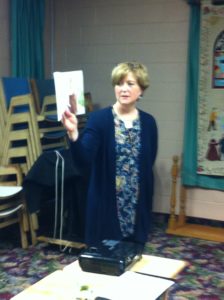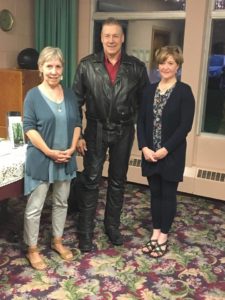Tag: relationships
20 Pointers for Raising Children (or Were They Raising Me?)
Over a period of six years, I brought three lovely daughters into the world. Like any new mom, I was excited but nervous, unsure of most things, questioning all and fumbling my way along. Is there a sure-fire way to ensure we raise our children well? Probably not. But somehow, in the big muddling mess of raising them, my daughters did grow into strong, independent, loving, contributing women, making their own way in the world. Looking back, these were some of the things I managed to do right.
1. Talk, talk, talk. Listen, listen, listen.
Right from the beginning, (and that includes the baby years, the toddler years, the youngster years, those terrible teen years), I would talk with my children about anything and everything. No topic was off limits. Sometimes I heard things I didn’t want to hear, but at least they knew they could always come to me and share their thoughts and their lives. And that meant receiving what they had to say, judgement-free. Lower those eyebrows, bite your tongue, and stay open-minded.
2. Respect
That little crying baby is crying for a reason. It’s the only way he can tell you how he feels. That little 2-year old with her repeated questions, “Why? Why? Why?” is trying to figure out the world and her place in it. Children are little people, growing and changing, and making their way in the world, just like you and I. Respect each stage of development. It’s who they really are at the moment.
3. Be reasonable. Both of you.
Is it really necessary that your little one eat every single bite of that spinach? No, not every time. Is it really necessary that he get to bed at a reasonable bedtime? Yes, otherwise you have one grumpy kid on your hands the next day. Pick your battles. You don’t have to win them all.
4. Learn the Art of Negotiation
“Mom, can I stay out till midnight?”
“No, I want you home by 10:00.”
“Aw. 11:30?
“9:30.”
“11?”
“9:00.”
“10:30?”
“8:30.”
“Fine. I’ll be home by 10.”
5. “Some” is good enough
“Mom, I don’t want to eat my squash.”
“Okay. You don’t have to eat it all. But I want you to eat two big teaspoons of it. That’s all.”
“There you go. You did one. One left. That’s all.”
“You did it! Good for you.”
Any kid can get through anything if it’s in small enough bites.
And that refers to everything, not just eating your supper.
6. “I will help you.”
A big job that seems overwhelming can be made simpler with helping hands. Teamwork is valued even in our adult world.
7. Play, Laugh, Be Silly
Be a kid yourself. We’re never too old to play.
8. It’s all about the journey.
Life is a process, not a product. Enjoy the process of any activity. Don’t just focus on the final product or goal.
9. Be a good example
It’s not a good idea to tell your teenager that they shouldn’t smoke while you’re standing there with a cigarette in your hand. “Do as I say, not as I do” is probably not the best way to raise your child. Be a good role model, yourself.
- Challenge your child. Within reason. (Remember #3)
Push gently. Help only as needed. Guide to correct answers.
Praise the accomplishments no matter how small.
During an Easter Egg Hunt, my little 2-year old was really having a difficult time finding that last egg. While her back was turned I dropped it to eye level. She still missed it. Next time her back was turned I dropped it right out in the open, so she couldn’t miss it. Then we praised her to the hills when she announced, “Yay! I found it!”
- Balance. Life is a balancing act.
Mind, body, spirit. Work, play, eat, learn, talk, pray as a family.
- Celebrate
Celebrate the small stuff. Be generous in your approach to life.
Birthdays and holidays are important, but so is the last day of school, the dog learned to sit up and “I got a goal!”
- I teach you. You teach me.
Recognize that your children can teach you as much as you can teach them. Life is a constant road of discovery. For both of you.
- Challenge yourself. Always do your best. Know your limits.
It’s okay to not have all the answers. It’s okay to fail.
It’s okay to make mistakes. They lead to what’s right.
- Unconditional Love
Be open-minded. Accepting. Non-judgemental.
Unconditional love is yours no matter what you do.
It’s a free and tightly-bound contract between you and I.
“I’ll love you forever.
I’ll like you for always.
As long as I’m living,
My baby you’ll be.”
Robert Munsch
- Live large.
“Live well, laugh often, love much.”
Share your wealth and talents with a generous spirit.
- Be positive. Live optimistically.
- Resilient people are survivors.
Be brave. Have courage. Turn and face the lions. You’ll find they’re not half as scary as you thought they were when you look them in the eye. Roll with the punches. Take baby steps. You will get through this. No matter how bad it seems “This, too, shall pass.”
- Detach
Know that we each have our own journey, our own lives to create. I, as your parent, can be there for you, but I am only a cheerleader watching you run your own race.
You are not a reflection of me. You don’t have to please me to feel that you have made it. And, vice versa, I have not failed you, if you fail.
Just remember, I will always love you in spite of whether you win, lose, fail or achieve in life.
- It’s not about you. It’s about them.
We all need a place to shine, to find a glory that is our own.
The world is a generous place of opportunity. There is enough to go around for all of us. Give your child opportunities to shine, even if they’re not that good. You never know what they will become.
In conclusion, even when we think our children have fallen away, be strong as a parent, be patient, be there for them whenever the opportunity arises, love them unconditionally. That tattooed, punctured, wild-haired, mouthy teenager will return to the real world and come out the other side sooner or later. Life will continue to teach them even after they have left the nest. Be the rock that they can return to over and over again in their life journeys.
Good luck. Parenting won’t be easy but it sure will be worth it!
Friends and Christmas Memories
This week a group of friends, all working and/or retired teachers, celebrated our Christmas pot luck dinner. I drove almost two hours one way to see them, as I do every month, but I love this group of friends and am willing to do it. We always go to Anne and Bobby’s log cabin home set back off a country road, surrounded by forest and fields. Years ago, they built this beautiful log home mostly by themselves; they dug their own well and set themselves up to be as self-sufficient as possible. They have a deep sense of stewardship for the earth and live as simply as possible. Their home is cozy and warm and I always feel welcome.
The group, as a whole, is creative and fun. We always go for a hike before dinner, enjoy our meal and then often play board games or share photos and conversations of recent trips or events. This month we had a celebrative Christmas party.
I arrived a little late and found Bobby putting the finishing touches on a Christmas tree set up in the corner. I complimented him on his choice, assuming that he had cut down one of the many trees on his property. He invited me to come take a closer look. I was amazed! He had found a dead maple tree trunk, put it in a pot and using fresh spruce boughs and a drill and ingenuity, inserted the live boughs to create a truly beautiful little Christmas tree.
“Would you call this a fake live tree or a live fake tree?” he laughed.
We always pick a theme for our dinner. This month, because it was Christmas, we all made ‘ginger’ dishes. There was carrot ginger soup, cheese and ginger mini sandwiches, ginger flavoured cheese, a stirfry with ginger sauce and rice, ginger and cabbage salad, ginger molasses cookies, chocolate covered candied ginger, and a lemon grass/ginger bubbling beverage.
After dinner we constructed a gingerbread house that turned into a gingerbread stable when one of the walls collapsed. We had lots of laughter and fun as each of us contributed to the Christmas creche we spontaneously created with two gingerbread figures for Mary and Joseph. A bright candy wrapper became a swaddling blanket for the baby Jesus, a tiny toy figurine Anne found that looked more like a tiny alien than a baby, and we stuck him into a gingerbread molasses cookie cradle. A plastic toy giraffe became the ‘donkey’ that carried Mary and Joseph to Bethlehem. Lyn, with a huge amount of patience, finished off the final touches to the gingerbread stable with candies and chocolate.
We exchanged gifts and cards: Moraine had a friendship bracelet for each of us, brought back from her recent trip to Guatemala; Lyn had hand-made soaps and toothpaste she had made at a local workshop; I handed out my own photo Christmas cards and Anne and Bobby gave us each a copy of their annual “Egbert Courier” newsletter.
Kathy brought a Christmas trivia game and we had fun asking each other questions and trying to come up with the correct answers as a group. Many of the questions had to do with Christmas carols and each time one came up, we would stop the game and sing a Christmas song together with Anne playing piano and Bobby his violin.
At the end of the night, we dimmed the lights, and with musical accompaniment and two part harmony, we sang “Silent Night” in unison. With lots of hugs and kisses, we said our goodbyes and wished each other a Merry Christmas.
For me, this was a memorable evening that I will treasure for years to come. It was the simple things that counted the most: good friendships, a tasty meal, music, hand-made gifts, and lots of laughter and spontaneity.
Merry Christmas to all. I pray that you too will have a memory-filled, happy holiday season.
A Perfect Day
I opened my eyes, adjusting to the morning light streaming through the crack in the curtains. Byron, my daughter’s dog, had decided to sleep with me last night and once he realized I was awake, he covered my face with kisses in anticipation of a morning walk. He waited patiently while I dressed and we quietly stepped outside onto the back lawn with its cloak of morning dew. Spring flowers were bursting, birds were singing.
Back inside, I started the morning coffee, turned on the computer, and then stuck my head in to see if my daughter and grandson were awake. There they were, in the middle of a morning feed, throwing smiles and kisses my way. Within a few minutes, my daughter brought my little grandson, just nine weeks old, out for morning cuddles while she slept a little longer.
He watched me as I finished my morning writing and emails, those bright Wedgewood Blue eyes not missing a beat. As our gaze caught, his big smile filled my heart.
Maegan woke up and after another bit of visiting, she left for a good long run with the dog along the river trails. My little guy and I had more cuddle and smile time. Holding a little baby in your arms is a precious thing.
When she and the dog returned, a bountiful breakfast and good conversation made for an easy-paced morning. Before I knew it, they had to go to head off for an appointment later in the day.
As I waved goodbye, I said a quiet prayer of gratitude for the love of my daughter, her little guy, and her beloved pet.
I got some computer work finished, notices, letters of thanks, and future appointments and retreated out to the back patio with my book and a warm cup of tea for the rest of the afternoon. The sky was blissfully blue, the birds were still singing, butterflies were dancing and a gentle breeze kept me cool in the warming sun.
Ah . . . this day couldn’t be better. Simple pleasures of shared family love, good food, good conversation, sunshine, spring flowers, butterflies and birds are all I need in my life. At least for this day. This perfect gem of a day.
A Search for Peace
This week has been an eventful week with the election of the Republican Donald Trump to the US Presidency. I thought, “How could that be? How could a man who campaigned on hate, racism, and division of classes and cultures, be voted into power by so many?”
A few days later, I attended my Writers’ Club where a group of seniors gathered together to share their stories. What I heard were stories of war and its casualties. I began to realize that it wasn’t just those who died in battle that suffered. Those who returned with lost limbs, broken hearts and minds, those who grieved loved ones lost, and those who lived at home with fear, separated families and hardships suffered too.
The next day, I attended a Remembrance Day ceremony in my local community. Those who spoke so eloquently, spoke not of the glory of war, but of its cost to families, communities and nations in frightful memories and shattering repercussions that carried on for a lifetime. It was a cry of gratitude for those who died, but even more so, it was a call for peace.
This week on social media, there has been much discussion and rhetoric about the political future of the US and predictions about future decisions and policies. I have come to realize that the reason Trump was elected to power is because there is a large group of citizens that are not happy with the status quo. Most citizens who voted for Trump want only their fair share of the economic pie and a call for honesty that ‘tells it like it is.’ It seems statistically a lot of them were from the working middle class. They don’t want to be rich, they don’t want to be poor. They just want enough. Enough to live comfortably on. That means food for their families, a home over their head, a secure job and future, enough money for a few luxuries now and then, maybe a family vacation once a year. They just want peace and contentment in their lives.
With all the voices I have heard and read this week, I have come to realize that all any of us wants is peace in our lives. We have the right as human beings to it. Sometimes we feel we need to speak out for that right, vote for that right, or fight for that right. Sometimes the repercussions of our shouts for peace are greater than we thought. Sometimes our actions in our quest for peace are not peaceful methods.
I pray for peace. I pray that we each can find peaceful avenues to seek that peace. I pray for ways and means that bind us together in peace, rather than divide us. I pray for leaders that use peaceful means to bring about equality and justice for all. I can start with myself. I can do it by searching for my own inner peace, encouraging and building peace within my family and other relationships, and generously contributing to peace-making, life-building efforts in my community, nation and planet.
All we want is peace. Consider carefully how you can find that peace for yourself.
Tragedy and Martyrdom
At the recent wedding of my daughter and her new husband, the room seemed to be immersed in love and positive feelings. It was a room filled with large and close family groupings. One of the extended families consisted of 63 adults, another included five siblings and their parents and partners. All the guests seemed to be enjoying themselves immensely and there was a deep sense of community, family, and love among them. I knew that it was a room filled with people who had experienced pain and deep tragedy in their lives, but they didn’t come across as tragic figures or martyrs.
I watched with pleasure as six adult sisters dressed up in costumes and goofed around at the fun photo booth set up in a corner of the reception hall. I’m sure each one of them had experienced deep tragedy in their lives; they had lost their beloved mother in the past year, one of them I knew had lost a child at a young age, but there they were laughing, embracing and sharing the deep bond they obviously had for each other. At another table, a family member, who is dealing with cancer and is in active chemotherapy treatments, was there laughing uproariously with his large family as they shared stories and love. Most important of all, both families were having fun.
Life should be fun. When bad things happen or things make us unhappy, we can wrap ourselves up in it, cut the tragic figure, “Oh, woe is me!” Sometimes we can even take great pride in our tragedy: “Look at me. Look at how wonderfully I am handling my pain, my loss. Aren’t I wonderful?” We become the great martyr.
The sisters didn’t do that. The father, sick and weak with cancer, didn’t do that. We can’t stop the pain in our lives, but we don’t have to let it become our identity, the suffering martyr, the mourning tragic figure.
To live a life well-lived, let us remember that we are not grief itself. We experience grief. It is not my cancer. It is just the cancer. Don’t make pain your identity. Let it not define who you really are.





